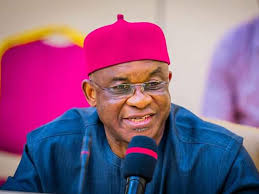You can feel the ground shifting. David Mark’s no preferred candidate doctrine is triggering tangible defections that reveal deep cracks in Nigeria’s established parties. Mohammed Kumalia, former APC stalwart and three-term House of Representatives member, defected on June 12, 2024, publicly citing the catastrophic failure of Tinubu’s Renewed Hope Agenda on security and economic inclusion. Ali Wurge, ex-PDP Chairman for Borno South, crossed over with 3,000 supporters in July 2024, declaring that ADC’s open-register policy lets communities own their future, not godfathers in Abuja.
In Ondo State, Eyitayo Jegede, PDP’s 2016/2020 gubernatorial candidate, joined ADC in May 2024, calling Mark’s transparency pledge the antidote to Ondo’s politics of betrayal. Agboola Ajayi, PDP’s 2020 deputy governor candidate, followed weeks later, bringing 12 local chapter coordinators. These defections dissolved PDP’s executive structure in Ondo’s Idanre and Ilaje LGAs. Abdullahi Ataka, former APC National Youth Mobilizer from Gombe, defected after ADC’s open primaries framework draft release, stating young members are tired of being youth wings—ADC’s sectoral groups let teachers write education policy, not just distribute rally flyers.
When Tinubu aide Bayo Onanuga dismissed ADC as haters of progress, ADC Secretary Rauf Aregbesola countered that a transparent house isn’t built by those who fear daylight, challenging opponents to open their membership registers.
Challenges to the Transparency Pledge
This revolution faces brutal stress tests. Dumebi Kachikwu, ADC’s 2023 presidential candidate, publicly accused Mark in August 2024 of stealthily backing Atiku Abubakar, violating the no preferred candidate vow. Kachikwu provided no evidence. ADC’s NEC suspended him on August 21, 2024, citing factionalizing without due process—a move critics called ironic given the transparency pledge.
APC and PDP defectors bring votes but risk importing old pathologies. Ex-APC Kaduna chairman Danladi Wada joined with 200 members in June 2024 yet faces scrutiny over alleged past contract fraud. ADC’s solution is mandatory public asset declarations for all aspirants, enforced by an independent audit panel launched July 30, 2024. Federal High Court Suit FHC/ABJ/CS/1436/2023 challenges Mark’s interim chairmanship as unconstitutional. The Court of Appeal reserved judgment on September 2, 2024. A ruling against ADC could fracture the coalition before primaries.
The Road to 2027: From Pledges to Practice
The ADC’s survival hinges on converting ideals into measurable actions. Mark’s September 2024 Sokoto declaration promised deploying regional security task forces within 90 days of taking power—no committees, just action. Aregbesola’s push for ANC-style ideological rigor materialized in ADC’s Manifesto Drafting Committees, chaired by academics from UNILAG, ABU, and UNN, with public consultations in 10 states.
Accountability architecture includes quarterly published membership rolls, with the first release scheduled for October 1, 2024—unprecedented in Nigerian politics. All candidates for 2027 elections will face open primaries using direct voting where secure, or delegate lists vetted by civil society observers under INEC-approved guidelines from August 2024. Rauf Aregbesola stated at the Lagos Policy Forum that transparency isn’t a slogan but publishing how much a ward chairman spent on diesel—and firing him if he steals.
Democracy’s Laboratory
David Mark’s no preferred candidate pledge is a live wire in Nigeria’s political nervous system. It shocks a system built on hidden kingmakers and predetermined outcomes. The ADC’s experiment forces a reckoning on whether a major party can survive without a godfather. Kachikwu’s accusations expose lingering distrust. Defectors risk carrying old venom into new veins. The courts could cripple the project overnight.
Yet momentum is undeniable. From Gombe’s open registers to Ondo’s collapsed PDP structures, Nigerians are gambling on transparency as the antidote to decay. Mark’s words at the October 1, 2024 National Convention ring prophetic: When our democracy faltered, we rose. The platform is ADC. The time is now. 2027 won’t just elect a president. It will test whether institutions can triumph over individuals. The ADC’s ledger—of audited membership, court victories, and policy clarity—will decide if hope anchors Nigeria, or sinks with the old order.


